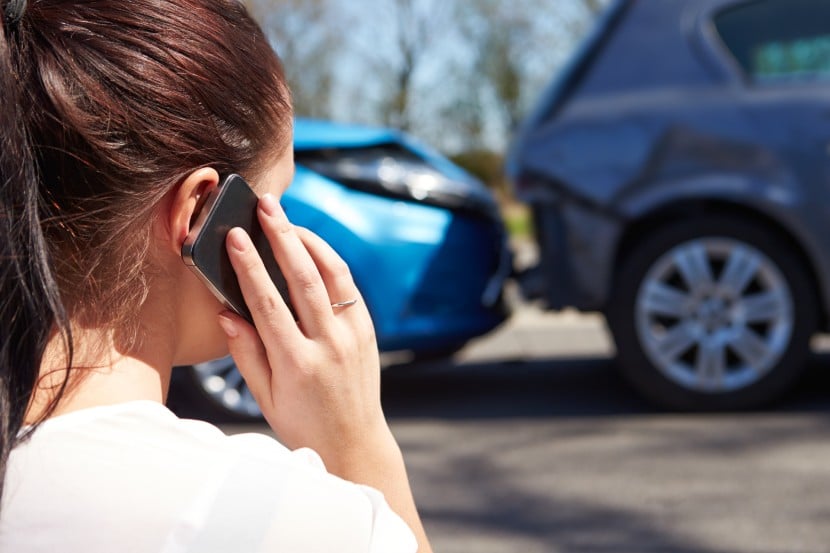Many of us will be involved in collisions at some point, which is a scary thought. According to GOV.UK there were more than 128,000 road users involved in a road accident in 2024.
But 1 in 5 drivers drivers admit that they don't know what to do if they were in an accident. Nearly half (49%) of drivers didn't realise that they had to report car accidents to their insurance company.
If you have a car crash, or minor bump or scrape, here's some car crash advice that could keep you and other road users safe - and also help you with any car insurance claims.

What do I do if I have a car crash?
Here's what you should do if you’re involved in a road traffic accident:
Check for injuries
Check yourself before checking any passengers or third parties. Make sure it's safe to leave the car before you do, though. It's worth noting if everyone involved appears unharmed.
Call 999 if necessary
You should call 999 if you need immediate help. For example:
- Someone is injured
- There's debris or vehicles blocking the road
- An animal has been killed or injured, such as a dog or farm animal
- The other person drives away and you don't have their details
- You suspect they crashed into you deliberately - potentially for a crash-for-cash scam to make a fraudulent insurance claim
- You suspect the other person is driving without insurance
- The other driver is under the influence of drugs or alcohol
- The other driver or someone at the scene is being aggressive or threatening
If you don't need immediate help, call 101 instead.
Get everyone to safety
Unless they're injured and unable to be moved, try to move all passengers away from the car and somewhere safe.
Exchange details with the other person
You should give your insurance details to the other driver, and they should give you theirs.
According to the research, almost half (45%) of those who have been involved in an accident in the past admitted that they didn't take the other driver's details.
Even if neither of you want to make a claim, it's important to have all the information. This includes:
- Car insurance policy numbers
- Number plates of the vehicles involved
- Drivers' names, addresses and phone numbers
- The details of the registered keeper, if they differ from the driver
Record details of the accident scene
Take photos and videos as well as written notes. Almost 2 in 3 (61%) drivers told us they didn’t take photo or video evidence of the accident scene.
This is key to help your claim, you should try and gather information such as:
- The time and date of the accident
- The weather and traffic conditions
- The quality of the road
- Any road markings or signs
- What happened in the accident – you could even include sketches
- The vehicle type, colour, make, model and registration
- An estimate of the speed the other vehicle was travelling and in what direction
- The other car’s condition
- The number of passengers in the other vehicle
- Details about the driver, such as contact information and a description
- Any witnesses or CCTV cameras
- Any damage to vehicles or property, as well as any injuries
- Any potential dash cam footage that could be used as evidence
Don't apologise
Don't say "I'm sorry", even in passing. This could be argued by the other party as an admission of fault.
Our research found that nearly 1 in 3 (32%) people who’ve been in an accident admit to apologising.
Although you’re not legally accepting responsibility by apologising, the other party could try to use it against you at a later date. This is something that the insurance companies figure out between themselves.
Report the accident to your insurer
Even if you don't want to make a claim, you should still let your insurer know that you've been in an accident.
1 in 2 (50%) drivers didn't alert their insurance company at the time of the incident. Even if it's just a small bump, you should tell your insurer.
Almost 1 in 4 (23%) drivers admitted that they didn't report a small bump to their insurer.
If you don't do this you risk:
- Voiding your insurance policy
- Steeper insurance prices
- Not being able to find insurance at all
Why do I have to report a car accident?
It’s a legal requirement to stop after an accident, no matter how minor it is. You can find more information on this in the Road Traffic Act.
Nearly half (49%) of UK drivers didn't know they should report any accident to their insurance company. 6% admitted that they didn’t declare the accident to their insurer.
If you're unable to speak to the driver of the other vehicle - for instance if you hit a parked car with no driver present - you need to stop, leave your details and report it to the police.
Driving off after an accident counts as a hit-and-run accident. This could lead to a fine, points on your licence or a driving ban.
Also, if you don’t report the accident, someone could claim against you later.
Let's say you bumped into someone’s parked car and drove off. You may have been caught on CCTV, or someone might have seen you and noted your reg plate.
Do I need to report the accident to my car insurance company?
Yes - you should report the accident to your insurer even if you’re not planning to make a car insurance claim.
This is because the other driver might decide to make a claim without you knowing.
And, regardless of whether you claim, your insurer needs to reassess your risk on the policy. This is likely to see your car insurance costs go up next year.
How long do I have to report a car accident to my insurance company?
You should report the accident to your insurer as soon as possible - ideally within 24 hours of the accident.
Most insurers have a limit on the time you have to report an accident. Check the details of your policy to find out exactly what this is.
When should I report an accident to the police?
You should report the accident to the police if:
- Anyone is injured
- You didn’t exchange details at the scene
- You believe a crime has been committed
You need to report the accident to the police by dialling 101 – the non-emergency police number – within 24 hours.
How long after a car accident can I claim on my car insurance?
If you want to claim for personal injury, you usually have up to 3 years to make a car insurance claim. This depends on the insurer though, so check your policy wording.
In general, the sooner you make a car insurance claim, the better. This lets your insurer investigate the accident while the relevant facts are still fresh. This should help speed up your claim.
*Unless otherwise stated, research carried out by One Poll on behalf of Confused.com of 2,000 UK drivers between 14th and 18th July 2025.

